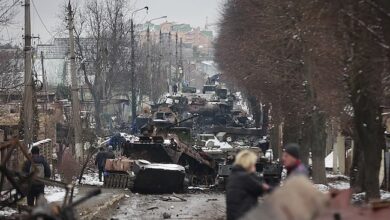Immigration into Europe has to slow down

“The truth is awful things are now happening. Last year there were race riots in Oldham in the old industrial revolution heartland of England. This year it is the burning of Jewish synagogues in Marseilles by Muslim youths angry at the Israeli response to the Intifada. All over Europe it is the undoubted rise of crime among immigrant youth.” I wrote that 20 years ago in my column. I couldn’t write that now. I would say that today looking at the continent as a whole there is less anti-immigrant violence around and less violence by immigrants themselves than there used to be.
Germany, by and large, has peacefully absorbed the 1 million immigrants it took in mainly from Syria in 2015-16 and the million Ukrainians it took in last year. In Sweden, along with Germany top of the list in taking in immigrants, young gangs of second-generation immigrants, it is true, have pushed up the murder rate but they are a tiny minority grouping who tend to kill rival gang members rather than the general public.
In Spain farmers employ en masse illegal African immigrants and house them in squalid conditions, but racial hostility and racial politics are rare phenomena. In Britain, the police over decades have a dreadful record in dealing with immigrants and the police too many times have provoked unnecessary conflict. But it is quite amazing to see how most immigrants have made a reasonable life for themselves in Britain- in jobs in the transport sector and the National Health Service, in professions as diverse as acting, novel writing, journalism and teaching, and have risen to high political office, especially in the right-wing Conservative Party.
Nevertheless, immigration is almost universally a hot political potato. There is constant pressure on governments to move to the right and be more restrictive. Witness the current British attempts to clamp down on the illegal traffic in small boats across the English Channel. Yet polls suggest immigration is no longer the hot button issue it was at the time of the Brexit referendum seven years ago when, as Michael Heseltine, Margaret Thatcher’s deputy, observed the other day, “race” was the big influencing vote determiner. It seems the popular media that likes to trade in stories of racial conflict has not caught up with public opinion.
But as time moves on, I don’t think this calls for a more liberal attitude to further immigration. It just means that we should be thankful we got thus far without more upsets. At some point we do have to draw the line. Africa’s population is growing too fast and neither African governments nor Western aid givers are investing enough in rural development- the one sure break on emigration. There are very few Mexican immigrants trying to enter the US these days, thanks to decades of development in Mexico’s border regions.
The industrialised countries have not been very good at diagnosing what has been going on in their societies as immigrants of a different colour flooded in after World War 2. Right back in the 1950s and early 1960s when Third World immigration first achieved significant proportions there were too many reports of racist attacks by angry whites, police brutality and insensitivity, job and educational discrimination at every level combined with an appalling general ignorance even by the intelligentsia of what was actually going on.
For example, there was a widespread assumption in the 1960s and 70s that immigrant crime rates were already higher than average when in fact right across Europe they were significantly lower. There was also a widespread assumption that these first-generation immigrants were attracted to Europe because of the access to welfare payments when in fact they were under-using such facilities relative to the general population and they only migrated when jobs were available. In Britain, immigrants had a much higher rate of home ownership than the indigenous working class. It took decades of agitation and lobbying before governments agreed to propose legislation that forbad discrimination, such was the ignorance of what the scene really was.
Tragically over time many of these misconceptions actually did become true. As the age profile changed and as the first generation’s children found their way forward blocked by prejudice, poor education and alienation from their own parents’ humble but purposeful lifestyles, unemployment, welfare dependency and crime began to climb. Despite these impediments, for a majority of immigrants there has been a way through, material life has become better and there has been significant individual achievement. Yet a too large minority have missed the boat and stayed back, estranged, seething, and in some cases prone to crime and even violence, as in Sweden.
We cannot close our eyes to what is happening today. It is too socially simplistic to point to economics and say we need immigrants to grease the wheels of the raw underbelly of modern society, working in the low wage economy, doing the difficult and dirty jobs at unsocial hours.
It is even more simplistic, as economists have often done, to point to the anti-inflationary contribution of the flow of new immigrants or to highlight the hypocrisy of advanced capitalist societies who don’t appear to accept that free trade and free flows of capital be balanced by the free flow of labour. Some are even arguing that the immigrant gates should be opened wide now that Europe has an ageing population and not enough young taxpayers to support the pensions of older people with their dramatically extended longevity.
The trouble is economists don’t usually live in tower blocks next to dysfunctional immigrant families. Neither do most politicians, academics nor journalists have their children playing in glass-strewn streets with tough, delinquent-inclined immigrant youth. Nor do they work on the assembly line cheek by jowl with young immigrant men who don’t speak their language very well, who don’t laugh at their jokes and who eat and socialize in a manner that is totally alien to their own traditions and lifestyle.
Most people in most countries are not prepared to change their cultural make up at the speed many Europeans have been asked to the last three decades. Yes, the world is becoming more cosmopolitan, but most of us still more easily identify with our own kind. Finding that balance is not easy.
Europe probably has to say “no” to further economic immigration (refugees are another matter) until it has digested properly what it has already swallowed and make more effort to sort out its present racial malaise. If it doesn’t the 45% of the vote that extreme right-wing politicians such as Marie Le Pen’s gain these days will climb to 50+% bringing onto centre stage the ugliness of right-wing political parties, which are staffed by extremists out on the political edge.




